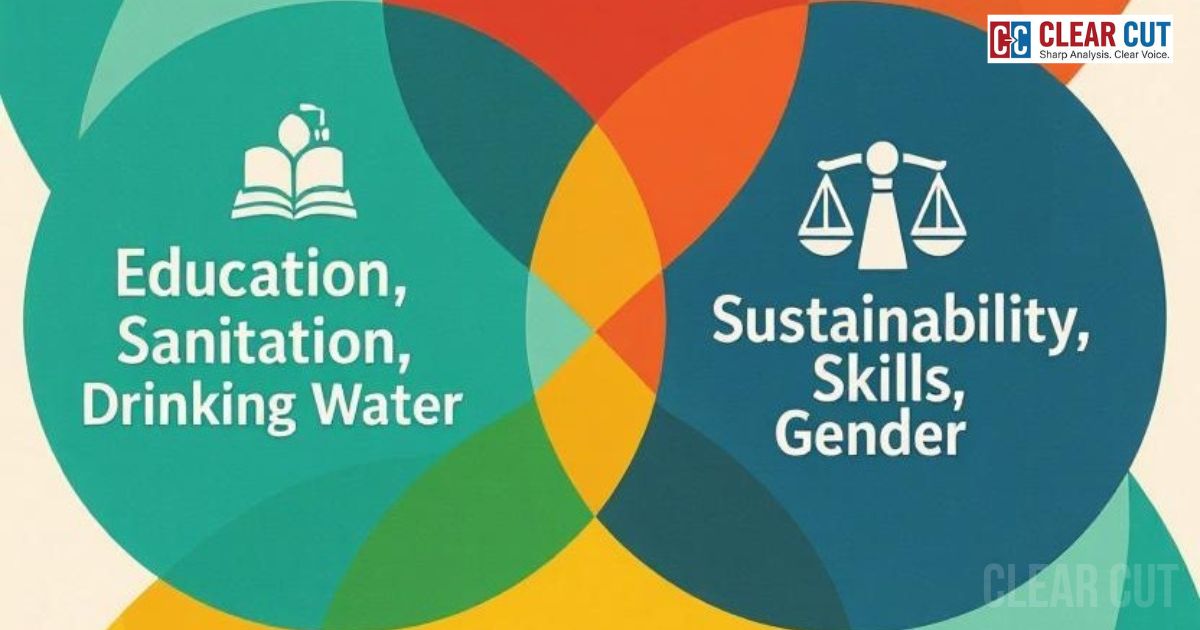Photo Credit: Antara Mrinal
Clear Cut Livelihood Desk
New Delhi, UPDATED: Sep 20, 2025 09:20 IST
Written By: Antara Mrinal
In September 2025, a surge of Corporate Social Responsibility (CSR) actions occurred across India, reflecting companies’ growing responsibilities not just for profits but also for their social contributions. Initiatives spanned public health, environmental recovery, and disaster response, with businesses actively addressing pressing societal issues.
Cyber Security Awareness Campaign by Karur Vysya Bank, Trichy :
Karur Vysya Bank (KVB) launched a 60-day cyber security awareness campaign in Trichy to educate the public on digital safety and fraud prevention. The campaign includes interactive sessions in schools, colleges, elder care facilities, and public spaces, along with a mobile van equipped with LED screens traveling around the city. Mr. S. S. Sundaram, Regional Manager of KVB Trichy, emphasized the need for such initiatives, stating, “Digital fraud is increasing, and many individuals, particularly seniors and school children, lack awareness of essential cyber hygiene. This initiative is designed to equip them with knowledge and practical skills.” During the campaign, KVB branches will serve as ‘digital self-defense kiosks’, offering hands-on support for securing online accounts, identifying phishing scams, and practicing safe online banking techniques. This initiative highlights the bank’s commitment to protecting communities as India rapidly advances toward a digital economy (Times of India).

Supporting Persons with Disabilities by BHEL, Trichy:
Bharat Heavy Electricals Limited (BHEL), Trichy, distributed physical and mobility aids to 75 individuals with disabilities in the district. The aids included wheelchairs, calipers, artificial limbs, and specialized furniture for children with special needs. “These interventions are vital because they allow people with disabilities to regain mobility, independence, and dignity,” said Mr. R. K. Mehta, Head of CSR, BHEL Trichy. Beneficiaries included individuals affected by cerebral palsy, muscular dystrophy, and polio.
BHEL’s ongoing CSR programs cover healthcare, education, community development, environmental protection, and skill development, reflecting its broader mission to create meaningful societal impact. The Lakhimpur Kheri administration distributed over 5,000 relief kits to families affected by recent floods. Each kit, valued at ₹900, contained essentials such as mosquito nets, umbrellas, battery-operated flashlights, sanitary pads, and water thermoses. This initiative, funded by a CSR program with a budget of ₹45 lakh, engaged local entrepreneurs and voluntary organizations to ensure swift distribution. District Magistrate Durga Shakti Nagpal emphasized, “Floods devastate livelihoods and health. These kits provide immediate relief while we work on long-term rehabilitation.” By addressing basic survival needs, this initiative demonstrates how CSR can complement government disaster response efforts (Times of India).
Reviving Cultural Spaces through Ghat Renovation Project, Kolkata:
The Syama Prasad Mookerjee Port, Kolkata (SMPK), in collaboration with private companies like Adani Ports and SEZ Ltd., Garden Reach Shipbuilders & Engineers Limited (GRSE Ltd.), Indian Hotels Company Limited (IHCL Group), and Triyogi Narayan Singh Logistics Park Private Limited (TNS Logi Park Pvt Ltd.), has begun redeveloping the ghats along the Hooghly River. The aim of the project is to turn the ghats into lively recreational and tourist-friendly areas, while preserving cultural heritage and enhancing public utility.
Mr. A. K. Jain, Project Director of SMPK, remarked, “Urban spaces need revitalization. This CSR project not only beautifies the city but also promotes tourism and community engagement.” This cooperative initiative demonstrates an understanding that urban infrastructure projects can lead to both economic growth and an improved quality of life. In Patna, the “Swachhta Hi Seva” cleanliness campaign was initiated to enhance sanitation and community hygiene.
The initiative focuses on bus stands, railway stations, markets, and heritage sites. Local gram panchayats have been designated three Cleanliness Target Units (CTUs) to address neglected waste dumps, while medical camps offer check-ups and social security support for sanitation workers. Additionally, the campaign encourages the avoidance of single-use plastics during festivals and aims to improve infrastructure such as Waste Processing Units (WPUs). Awards for recognition will be given on Gandhi Jayanti (October 2) to individuals and villages that achieve “open-defecation-free plus” status (Times of India).

The Driving Forces Behind These CSR Initiatives:
Across sectors, the motivations behind recent CSR activities in India reveal several common threads. Companies are addressing urgent social needs, such as flood relief and disability support, providing immediate benefits to vulnerable populations. At the same time, initiatives like cybersecurity awareness and sanitation campaigns enhance community resilience, empowering citizens to adopt preventive measures.
Cultural and environmental stewardship is also a priority, with projects like ghat renovations and urban development preserving heritage while promoting sustainable tourism. Additionally, many CSR programs align with government initiatives, complementing national schemes such as “Swachhta Hi Seva” and disaster management efforts. Together, these efforts show how corporations leverage CSR not only to fulfill statutory obligations under the Companies Act but also to strengthen societal well-being, build brand reputation, and cultivate a culture of social responsibility.
From promoting digital literacy and public health to disaster relief and urban development, September 2025 has seen Indian corporates take significant steps to positively impact society. As India faces rapid urbanization, environmental challenges, and a digital transition, CSR programs evolve to address not just immediate needs but also long-term societal transformation. These initiatives highlight a larger trend: businesses are not merely profit-driven entities; they are pivotal stakeholders in the nation’s social and developmental journey.




